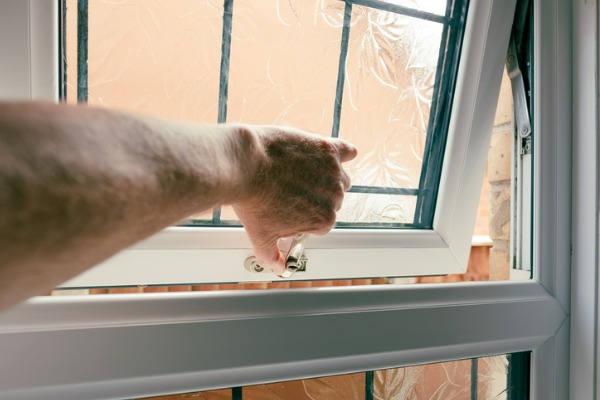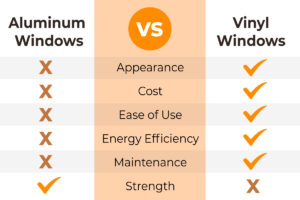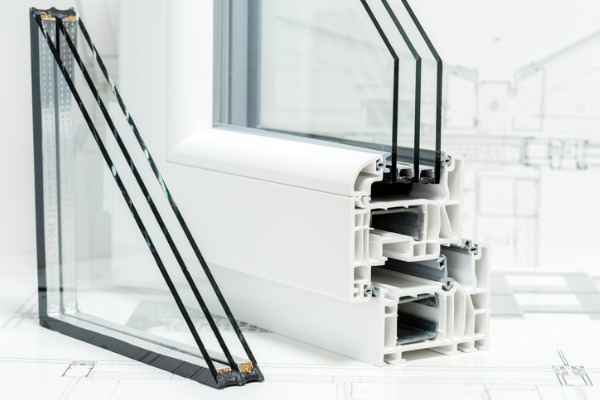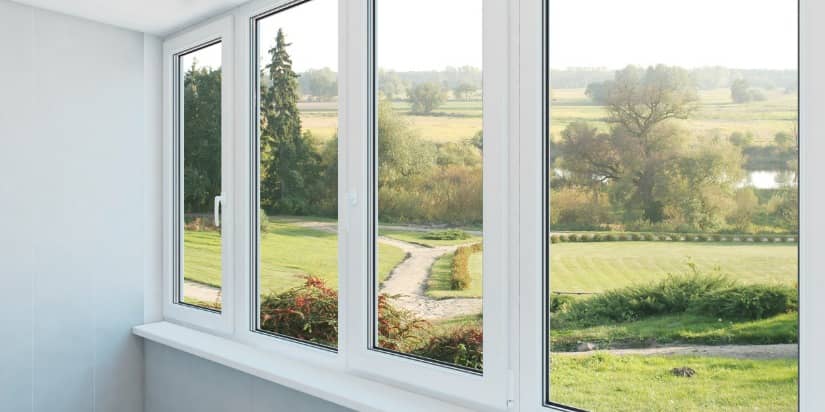Options are great. What’s not so great is indecision. You’ve come so close by narrowing your options to vinyl or aluminum windows, but you’re not sure which way to go.
We get how frustrating this uncertainty can be. That’s why we’ve written this blog to give you a clear path forward.
We’re window replacement experts with over 30 years of experience serving homes in the greater Chicago region. In that time, we’ve come to realize that the aluminum vs. vinyl windows debate isn’t as close a competition as most homeowners think it is.
Instead, there’s one clear winner.
In this post, we’ll show you which type of window is better and help you find the highest quality window for your home. Let’s get started!
Aluminum vs. Vinyl Windows: Evaluating 6 Important Factors
When it comes to choosing between different materials for windows, there are six crucial factors to consider:
- Appearance
- Cost
- Ease of use
- Energy efficiency
- Maintenance
- Strength
You obviously want your windows to have favorable marks in all these categories. So, the question is how do aluminum and vinyl measure up?
Let’s look at the difference between vinyl and aluminum windows for each of the six factors and see which option comes out on top.
1. Appearance: Which Will Make Your Home Look Better?
One of the main functions of a window is to make your home more beautiful. The most obvious way it does this is by letting in plenty of natural light. But equally important is how the window’s style blends in with the look of a room.
So, which window is better for beautifying a home: vinyl or aluminum windows?
Let’s start with aluminum. The metal window frames are somewhat limited in the aesthetic value they can provide. The smooth material provides a sleek, modern look, which is one of the reasons it works well for business storefronts.
However, aluminum doesn’t pair as naturally with most residential homes. Unless your home has modernist architecture, the metal frames will probably look out of place. You can try to paint them to make them look like traditional wood frames, but they still won’t look totally natural in a traditional home.
On the other hand, vinyl windows have a much easier time blending with their surroundings. This is because manufacturers can produce vinyl frames that look like traditional wood windows. They can even give them wood texture. As a result, vinyl windows typically look more at home in a residential property than aluminum windows.
Winner: Vinyl
2. Cost: Which is Less Expensive and More Valuable?
When choosing between windows you must resist the urge to go with the option with the lowest price tag. After all, the adage “You get what you paid for” is especially true when it comes to windows.
This isn’t to say that you shouldn’t try to save a few bucks when shopping for windows. Rather, you should also factor in how much value the windows will provide you.
So, instead of “Which window is the cheapest?” a better question to ask is, “Which window provides the most value at an affordable price?”
When comparing vinyl and aluminum windows, the answer to both halves of that question is vinyl.
Vinyl windows are generally more affordable than aluminum. According to an in-depth study by the website Fixr.com, the price of vinyl windows ranges from $200 to $600, while the range for aluminum is $300-$950.
As you probably noticed, those price ranges overlap, meaning sometimes vinyl can be more expensive than aluminum. In these instances, the question of value is especially important to consider.
Which type of window offers more benefits for the money you spend? As we will see, vinyl can improve your home, lower your bills and reduce your stress more than aluminum can while also being generally more affordable. Therefore, vinyl wins the cost battle easily.
Winner: Vinyl
3. Ease of Use: Which is Easier to Open and Close?
Ah, the simple joy of opening the windows in the spring and summer. What’s sweeter is not having to struggle to get the windows open! Therefore, ease of use is an essential quality for residential windows.
Unfortunately, aluminum windows aren’t always the easiest to open. If they aren’t lubricated regularly, the friction between the metal surfaces makes them downright impossible to slide. Aluminum frames also tend to dent easily, which can prevent them from sliding. You’ll need to straighten those dents out to get the window working properly again.
For this reason, you’ll usually only see aluminum frames used on windows that aren’t designed to open, such as big picture windows or storefront windows in businesses. Aluminum is much better suited to stand still and hold those heavy pieces of glass.
Vinyl windows don’t run into as many issues with operation as aluminum. You don’t need to regularly lubricate them to keep them operational and small dents don’t prevent them from sliding. The only issue that can keep them from working properly is the buildup of dust and debris. But you can prevent this from happening by occasionally cleaning the tracks.
For these reasons, vinyl windows tend to be easier to open and close than aluminum.
Winner: Vinyl

Vinyl windows are much easier to open and shut than aluminum frames.
4. Energy Efficiency: Which Will Keep Your Bills Lower?
One of the best ways vinyl windows can help homeowners in Northern Illinois is by insulating their homes during the blazing summers and frigid winters.
Quality vinyl windows are great for this. Vinyl frames contain insulation material to keep those scorching and freezing temperatures outside where they belong. And because they are so well insulated, they also keep condensation on the windowpanes to a minimum.
Unfortunately, the same cannot be said for aluminum windows. The problem with aluminum frames is they conduct hot or cold air into the home rather than keeping it out. Rooms are more uncomfortable and energy bills rise as a result.
Furthermore, rather than preventing condensation like vinyl, aluminum promotes it. All sorts of costly problems can result, including mold and mildew growth on the walls and ceilings.
Since it raises costs rather than lowers them, vinyl once again beats aluminum in this round.
Winner: Vinyl
5. Maintenance: Which are Easier to Care For?
The less time we must spend maintaining our windows, the better! We all feel this way, which is one of the reasons aluminum and vinyl windows are so popular. Both require very little maintenance, yet one type needs even less than the other!
Aluminum windows come with two required maintenance tasks:
- Cleaning with an aluminum cleaner
- Lubrication with a special aluminum lubricant
Ideally, you should perform these tasks at least once every three months to keep the windows in good shape.
You should also clean vinyl windows regularly, but you don’t have to use any special products to do so. Dusting and wiping them down with a rag should be enough to keep your vinyl windows in good shape.
Aluminum windows can also require occasional repainting to keep them looking sharp. However, vinyl windows don’t require painting, making them much lower maintenance.
So, because they’re slightly easier to care for, vinyl edges aluminum in the maintenance category.
Winner: Vinyl
6. Strength: Which Holds Up Better?
Window strength is another key category, especially for homes with large picture windows or homes located in areas prone to severe storms. These residences need a strong material to keep their windows standing strong.
Aluminum shines in this category. The metal frames are strong enough to stand up against hurricane-force winds, making them a popular choice for tropical areas.
Vinyl doesn’t hold up quite as well as aluminum in this category. Still, manufacturers have designed impact-resistant vinyl to make up for some of its deficiencies.
Aluminum windows also tend to last longer than their vinyl counterparts. The material can last around 40-50 years if properly maintained. The expected lifespan of vinyl windows is a bit shorter at 20-40 years.
Because it tends to stand stronger and last longer, aluminum gets the victory here.
Winner: Aluminum

Vinyl windows outperform aluminum in five out of six key categories.
The Verdict: Vinyl Windows Win by a Landslide
By a score of 5-1, vinyl windows win the window war! Vinyl is a better material for residential windows than aluminum because it provides better looks, a superior cost-value ratio, higher energy efficiency and more!
But aluminum shouldn’t hang its head! There’s still a place for aluminum windows in our society. They’re an excellent option for commercial buildings, modernist architecture and structures that need to withstand hurricane-force winds.
However, for homeowners in McHenry, IL, and the surrounding region, vinyl is our expert recommendation.
But here’s the thing. Not just any vinyl can win this battle. There are some vinyl windows out there that fall short in key categories.
So, how do you make sure the vinyl windows you’re getting are of the highest quality? We’ll look at that next.
How to Find High-Quality Vinyl Windows for Your Home
To ensure your vinyl windows will provide all the benefits described above, ask these two questions of them:
- What type of vinyl is the window made of?
- How was the window constructed?
We’ll take a closer look at how to explore these questions below.
1. What Type of Vinyl is the Window Made of?
Vinyl is a human-made material, and not all people make it the same way. Different manufacturers throw different ingredients into the mix. But two ingredients should always be in your vinyl to protect it from warping or yellowing over time: titanium dioxide and organic tin. So, be sure to look for those ingredients when shopping for windows.
You should also check how much virgin vinyl and reground vinyl are in the window. Virgin vinyl contains no repurposed material, while reground vinyl consists of scrap material left over from previous window manufacturing processes. It’s called “reground” because the left-over material was ground up and reused to help create a new window.
Virgin vinyl is much stronger than reground vinyl. So, a quality window will always have more virgin than reground in its composition. A window doesn’t need to be 100% virgin. In fact, it often helps to have a little reground material in the mix to make the window stronger. Still, it shouldn’t have too much reground material.
We recommend looking for a window with less than 20% reground vinyl in its composition. These windows will often have a stamp of approval from the Vinyl Siding Institute (VSI) to certify their quality.
2. How Was the Window Constructed?
Another key to the highest quality vinyl windows lies within the frame. Whereas low-quality frames are hollow inside, there’s a lot going on within the best ones. These frames contain many interlocking chambers to reinforce the strength of the material. And within those chambers is a lot of insulation.
There are a couple of good ways to identify windows with these strong frames. One is to ask to see a cross-section of the inside of the frame. This way, you can see for yourself what’s going on in there. Another sign of quality is if the frame has a lower U-Factor and Solar Heat Gain Coefficient on its label from the National Fenestration Rating Council (NFRC).
You can also look for signs of quality construction on the outside of the window frame too. The corners should be welded together seamlessly rather than held together by brackets or screws. These windows will be much sturdier and perform better over time.

The best vinyl windows will have many interlocking chambers within their frames.
Interested in Vinyl Window Replacement for Your Home?
You can’t go wrong with quality vinyl windows for your home. They outperform aluminum windows in nearly every category, and there are easy ways to find the highest quality vinyl frames on the market.
So, what are you waiting for? It’s time to get out there and find the right vinyl windows for your home.
If you’re looking for a company to help you find and install those windows, we’d be happy to assist. We work with homeowners every day to help them find the best window solutions for their homes.
Please contact us today at 833-367-9687 to speak to an expert and request a consultation.





